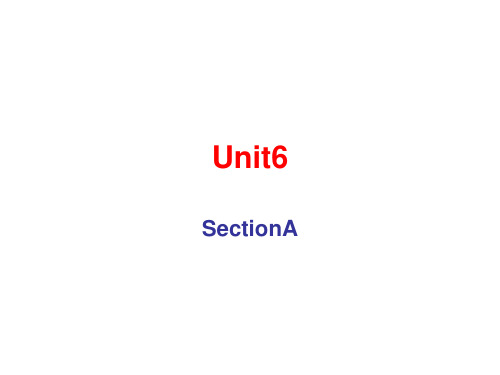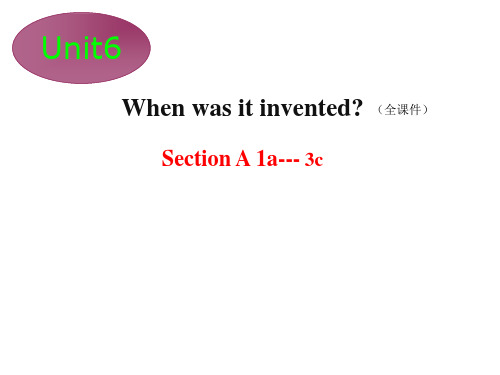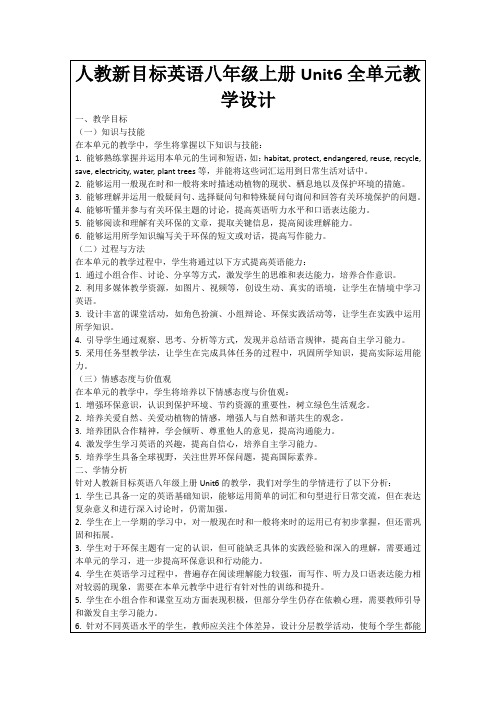Unit 6 全单元
合集下载
人教版英语八年级上册unit6 全单元课件

a doctor a cook
a pilot
Computer programmer
doctor
teacher driver
Jobs
cook reporter doctor
policeman singer
比一比谁反应更快
Step 5
Do you think these jobs are interesting? Rank them(1-12).
What do you want to be when you grow up? 长大
I want to be a basketball player.
I want to be a teacher. I want to be an actor.
1a Which job is the most interesting?
of course. What do you want to be? Andy: My parents want me to be a doctor, but I’m
not sure about that. Ken: Well, don’t worry. Not everyone knows what
an actor 演员
take acting lessons (上表演课)
1b
Listen and fill in the blanks. Then match the items.
1. computer programmer 2. basketball
player
3. engineer
a. take _a_c_t_in_g__ lessons
I want to be a basketball player.
Unit6大单元整体教学设计人教版英语九年级全册

4.通过对篮球进一步的了解,拓宽知识面,保持对运动的热爱;理解永不言弃,团队合作的篮球精神。
5.通过讨论,小组合作积极探究,发散思维,大胆想象,保持对科
学发明探索的热爱。了解一些近现代发明的时间及用途,激发自己热爱发明的情感。培养想象力,善于观察事物。面对难题,用积极的态度去解决,发挥想象力,认识世界,改造世界。
3听懂并完成听力任务;能够利用所学知识复述制作薯片的步骤;能正确运用被动语态谈论美食的发明历史,掌握本文涉及到篮球相关话题的新词汇和短语,了解篮球的发明以及发展历史,借助思维导图对文章关键内容进行复述。
单元
课时安排
教学内容
教学目标
教学重难点
Period ⅠSection A(1~2d)
1.学习与发明相关的生词和短语。
2.学习一般过去时的被动语态。
1.能谈论物品被发明的时间、发明者,表达某发明的用途。
2.了解一些近现代发明的时间及用途,激发自己热爱发明的情感。培养想象力,善于观察事物。面对难题,用积极的态度去解决,发挥想象力,认识世界,改造世界。
1.重点:
(1)掌握本课时的单词、词组和句型,学习运用一般过去时态的被动语态。
核心素养
单元教学
目标
语言
能力
1.初步感知一般过去时下的被动语态。正确理解和使用被动语态的一般过去时结构,将主动语态与被动语态进行自由转换。理解并识别被动语态的特殊情况。
2.通过图片呈现新单词,记住新单词的词义。能听懂谈论发明物的相关对话。通过语篇阅读,学习掌握下列新单词和短语:ruler, boil, remain, smell, saint, national, by accident, take place, without doubt。
5.通过讨论,小组合作积极探究,发散思维,大胆想象,保持对科
学发明探索的热爱。了解一些近现代发明的时间及用途,激发自己热爱发明的情感。培养想象力,善于观察事物。面对难题,用积极的态度去解决,发挥想象力,认识世界,改造世界。
3听懂并完成听力任务;能够利用所学知识复述制作薯片的步骤;能正确运用被动语态谈论美食的发明历史,掌握本文涉及到篮球相关话题的新词汇和短语,了解篮球的发明以及发展历史,借助思维导图对文章关键内容进行复述。
单元
课时安排
教学内容
教学目标
教学重难点
Period ⅠSection A(1~2d)
1.学习与发明相关的生词和短语。
2.学习一般过去时的被动语态。
1.能谈论物品被发明的时间、发明者,表达某发明的用途。
2.了解一些近现代发明的时间及用途,激发自己热爱发明的情感。培养想象力,善于观察事物。面对难题,用积极的态度去解决,发挥想象力,认识世界,改造世界。
1.重点:
(1)掌握本课时的单词、词组和句型,学习运用一般过去时态的被动语态。
核心素养
单元教学
目标
语言
能力
1.初步感知一般过去时下的被动语态。正确理解和使用被动语态的一般过去时结构,将主动语态与被动语态进行自由转换。理解并识别被动语态的特殊情况。
2.通过图片呈现新单词,记住新单词的词义。能听懂谈论发明物的相关对话。通过语篇阅读,学习掌握下列新单词和短语:ruler, boil, remain, smell, saint, national, by accident, take place, without doubt。
人教版八年级英语上册Unit6全单元课件

What do you want to be when you grow up? 长大; 成熟; 成长
I want to be a football player.
I want to be a teacher. I want to be an actor.
computer programmer 计算机程序设计员; 编程人员
driver n. 司机; 驾驶员
drive (驾驶) + (e)r →driver 驾驶员 e.g. My uncle works as a bus driver in
Beijing. 我叔叔在北京工作。他是一名公交 车司机。
be sure about 确信; 对……有把握
e.g. Are you sure about the exam? 你对这个考试有把握吗?
engineer n. 工程师
doctor n. 医生
pilot n. 飞行员
cook n. 厨师
scientist n. 科学家
violinist n. 小提琴手
violin (小提琴) + ist (职业) →violinist e.g. 她的梦想是当一名小提琴家。
Her dream is to be a violinist.
make sure 确保; 查明 e.g. Make sure you get there on time.
你一定要确保准时到达那里。
Do you think these jobs are interesting?
1a Rank them [1-12](1 is most interesting,
How are you going to do that?
人教九年级英语Unit6全单元知识点讲解

Unvent v.发明 指发明以前从未存在的东西。
eg:---Do you know who invented the light bulb(电灯泡)?
---Edison.
拓展:
inventor n.发明家
invent v.发明
invention n.发明
Edison,a great ________,________ many
Boil the potato for 20 minutes. 把土豆煮20分钟。 Water boils at 100℃. 水在100℃沸腾。
• remain v.保持不变;剩余 ① 作连系动词,“仍然是(处于某种状态);
保持不变”=keep。其后可接形容词、名词、 分词或介词短语作表语。
eg;The room remains cool all summer. 这个房间整个夏天保持凉爽。
• by accident 偶然;意外地=by chance eg:我在街上偶然遇到了Tom。
I met Tom by accident in the street.(作 状语)
Tea was invented _b__y_a_c_c_id__en__t _.
• nearly(almost) adv.几乎;差不多 eg:我几乎从自行车上摔下来。
great _________ during his life.
• heel n.鞋跟;足跟 • scoop n.勺;铲子 • electricity n.电;电能
• style n.样式;款式;风格;方式
eg:The style of the shirt is just in season.
I wouldn't tell lies to you.That's not my style. in style流行的;时髦的 out of style过时的 a life style生活方式
eg:---Do you know who invented the light bulb(电灯泡)?
---Edison.
拓展:
inventor n.发明家
invent v.发明
invention n.发明
Edison,a great ________,________ many
Boil the potato for 20 minutes. 把土豆煮20分钟。 Water boils at 100℃. 水在100℃沸腾。
• remain v.保持不变;剩余 ① 作连系动词,“仍然是(处于某种状态);
保持不变”=keep。其后可接形容词、名词、 分词或介词短语作表语。
eg;The room remains cool all summer. 这个房间整个夏天保持凉爽。
• by accident 偶然;意外地=by chance eg:我在街上偶然遇到了Tom。
I met Tom by accident in the street.(作 状语)
Tea was invented _b__y_a_c_c_id__en__t _.
• nearly(almost) adv.几乎;差不多 eg:我几乎从自行车上摔下来。
great _________ during his life.
• heel n.鞋跟;足跟 • scoop n.勺;铲子 • electricity n.电;电能
• style n.样式;款式;风格;方式
eg:The style of the shirt is just in season.
I wouldn't tell lies to you.That's not my style. in style流行的;时髦的 out of style过时的 a life style生活方式
九年级英语unit6全单元课件

1
2
3
4
computer
TV
A: I think the … was invented before the …. B: I disagree.( I agree. ) I think the… was invented after the….
car
clock
A: I think the … was invented before the …. B: I disagree.( I agree.) I think the… was invented after the….
The zipper.
It was invented by Whitcomb Judson.
In 1893.
In 1917.
On dresses, trousers, shoes, bags,… almost everywhere.
1). (2012辽宁大连) ---Thank you for taking me around your school, Daming. --- ________ A. Don't mention it. B. Never mind. C. Of course not. D. No problem. 2). --- Sorry, Sir. I made a mistake again. --- _____. Practice more and you will do better. A. Never mind B. I’m not sure C. You’re welcome D. Don’t mention it
inventions
with
use
for
hit
bathroom
八下英语Unit6全单元课件

1
2
3
4
2b
Listen again and circle the words you hear.
1. A man saw Yu Gong and his (children / moving the mountains.
2. He told Yu Gong he could never do it weak).
2. shoot v. 射击;发射 过去式及过去分词形式:shot, shot
e.g. He shot the bird with his gun. 他用枪打鸟。
3. stone n. 石头
e.g. The soil is full of stones. 这土里有很多碎石。 He threw a stone at the dog. 他向狗掷了一块石头。
2. What happened next?
The old man told his family that they should all helped him to move the mountains.
3. Where would they put all the earth and stone from the mountains?
a___ Yu Gong Moves a Mountain
___ Nu Wa Repairs the Sky.
d c
1. once upon a time = long, long ago 从前
常用于讲述故事开头的词语
e.g. Once upon a time, there lived three monks in a small temple. 从前,在一个小庙里住 着三个和尚。
八年级英语下册-Unit6全单元ppt课件

“雪亮工程"是以区(县)、乡(镇) 、村( 社区) 三级综 治中心 为指挥 平台、 以综治 信息化 为支撑 、以网 格化管 理为基 础、以 公共安 全视频 监控联 网应用 为重点 的“群 众性治 安防控 工程” 。
2c. Look at the pictures in 2a and tell the story in your own words.
Claudia: Really? I think it’s a little bit silly. It doesn’t seem very possible to move a mountain.
“雪亮工程"是以区(县)、乡(镇) 、村( 社区) 三级综 治中心 为指挥 平台、 以综治 信息化 为支撑 、以网 格化管 理为基 础、以 公共安 全视频 监控联 网应用 为重点 的“群 众性治 安防控 工程” 。
2d. Role-play the conversation.
Teacher: So what do you think about the story of Yu Gong?
Wang Ming: I think it’s really interesting. Yu Gong found a good way to solve his problem.
“雪亮工程"是以区(县)、乡(镇) 、村( 社区) 三级综 治中心 为指挥 平台、 以综治 信息化 为支撑 、以网 格化管 理为基 础、以 公共安 全视频 监控联 网应用 为重点 的“群 众性治 安防控 工程” 。
1a. Match the story titles with the pictures [a--d].
Claudia: Well, there are many other ways. For example, he could build a road. That’s better and faster than moving a mountain!
人教新目标英语八年级上册Unit6全单元教学设计

1.学生已具备一定的英语基础知识,能够运用简单的词汇和句型进行日常交流,但在表达复杂意义和进行深入讨论时,仍需加强。
2.学生在上一学期的学习中,对一般现在时和一般将来时的运用已有初步掌握,但还需巩固和拓展。
3.学生对于环保主题有一定的认识,但可能缺乏具体的实践经验和深入的理解,需要通过本单元的学习,进一步提高环保意识和行动能力。
4.引导学生通过观察、思考、分析等方式,发现并总结语言规律,提高自主学习能力。
5.采用任务型教学法,让学生在完成具体任务的过程中,巩固所学知识,提高实际运用能力。
(三)情感态度与价值观
在本单元的教学中,学生将培养以下情感态度与价值观:
1.增强环保意识,认识到保护环境、节约资源的重要性,树立绿色生活观念。
2.教学方法:采用图片、实物展示,结合例句,让学生在实际语境中理解和运用所学知识。
3.设计意图:帮助学生掌握环保主题的相关词汇和句型,为后续的讨论和表达打下基础。
(三)学生小组讨论
1.教学内容:针对环保主题,引导学生讨论以下问题:“What are the main environmental problems in our country?”、“How can we protect the endangered animals?”、“What can we do to save energy and reduce pollution?”等。
2.词汇教学:通过图片、实物展示等方式,帮助学生直观地理解和记忆环保词汇,同时结合例句,让学生在实际语境中运用。
3.句型练习:设计角色扮演、小组讨论等活动,让学生在实际对话中练习一般现在时和一般将来时的句型,提高口语表达能力。
4.听力训练:播放与环保相关的听力材料,引导学生进行信息提取和总结,提高听力水平。
2.学生在上一学期的学习中,对一般现在时和一般将来时的运用已有初步掌握,但还需巩固和拓展。
3.学生对于环保主题有一定的认识,但可能缺乏具体的实践经验和深入的理解,需要通过本单元的学习,进一步提高环保意识和行动能力。
4.引导学生通过观察、思考、分析等方式,发现并总结语言规律,提高自主学习能力。
5.采用任务型教学法,让学生在完成具体任务的过程中,巩固所学知识,提高实际运用能力。
(三)情感态度与价值观
在本单元的教学中,学生将培养以下情感态度与价值观:
1.增强环保意识,认识到保护环境、节约资源的重要性,树立绿色生活观念。
2.教学方法:采用图片、实物展示,结合例句,让学生在实际语境中理解和运用所学知识。
3.设计意图:帮助学生掌握环保主题的相关词汇和句型,为后续的讨论和表达打下基础。
(三)学生小组讨论
1.教学内容:针对环保主题,引导学生讨论以下问题:“What are the main environmental problems in our country?”、“How can we protect the endangered animals?”、“What can we do to save energy and reduce pollution?”等。
2.词汇教学:通过图片、实物展示等方式,帮助学生直观地理解和记忆环保词汇,同时结合例句,让学生在实际语境中运用。
3.句型练习:设计角色扮演、小组讨论等活动,让学生在实际对话中练习一般现在时和一般将来时的句型,提高口语表达能力。
4.听力训练:播放与环保相关的听力材料,引导学生进行信息提取和总结,提高听力水平。
- 1、下载文档前请自行甄别文档内容的完整性,平台不提供额外的编辑、内容补充、找答案等附加服务。
- 2、"仅部分预览"的文档,不可在线预览部分如存在完整性等问题,可反馈申请退款(可完整预览的文档不适用该条件!)。
- 3、如文档侵犯您的权益,请联系客服反馈,我们会尽快为您处理(人工客服工作时间:9:00-18:30)。
二.选择填空. D 1.My mother is _____TV. A.looking at B.seeing C.reading D.watching C 2.---____you ____a book? ---Yes,I am. A.Do,read B.Are ,read C.Are ,reading D.Are ,looking D 3.Kate _____,the other students _____. A.sing,listen B.is singing,is listening C.sing,are listening D.is singing,are listening C 4.I ___my eraser,but I can’t ______ it. A.look for ,finding B.am finding,look for C.am looking for,find D.find,look for
如:
How’s the weather in Beijing?
= What’s the weather like in Beijing?
4) 对“天气”提问用“How’s the weather?”
如:
It is snowy today.
→ How’s the weather today?
5) weather 天气。不可数名词。如:
北京夏天天气怎么样?
2) 回答用“It’s + 表示天气状况的形容词”,
如:
---How’s the weather today?
---It’s cloudy. ---It’s windy and cold.
---It’s sunny but kind of windy.
3) 同义句为:What’s the weather like?
It’s a bad weather. (错。去掉a)
How’s the weather in…?
Beijing
Boston
Shanghai Toronto
Moscow
Who is the best reporter?
Weather Forecast
(二)由疑问词how引出的问候句型
How is it going ?最近怎么样?最近好不好?
现在进行时 (be+动词-ing)
现在进行时的陈述句和一般疑问句的表达形式
就能发生的事做现场报道
单 元 检 测
一.用所给动词的适当形式填空. is running 1.Look! The cat____________(run)up the tree. are having 2.Her parents__________(have)breakfast. Is 3.----___hecleaning ________(clean) the blackboard? ----No,he isn’t. 4.Tom__________(play)the piano in the is playing room.Please ask him to come here. 5.Listen! They____________(sing)in the are singing classroom.
学习目标
1. 学会运用形容词描述天气。 2. 学会用“How’s the weather in ……? It’s sunny”描述并谈论天气。 3. 学会用“What’s she doing ? He’s cooking.” 谈论人们正在做的事情。 4. 学会使用简单的电话用语。 5. 掌握 how 引导的特殊疑问句。 6. 能写出在某种天气下人们正在进行某项活动 的简单文章,熟练运用现在进行时。
1)后可接with sb/ sth.用来表达对朋友、家人的 关怀。 如:How’s it going with Peter? 彼特最近怎么样? How’s it going with your study? 你最近学习怎么样?
2)回答可用 --- It’s --- It’s --- It’s --- It’s
许多云彩。
小结:
n.
adj.
cloud wind rain snow sun fog
cloudy windy rainy snowy sunny foggy
n.+y
adj.
dry
humid/wet
warm
cool
hot
cold
二、表示情绪的形容词。
surprised 感到惊讶的 relaxed 放松的,得到休息的
三.句型转换 1.I am watering the flowers.(否定句)
I am not watering the flowers.
2.She’s opening the box now.(一般疑问句)
Is she opening the box now?
3.The boys are playing cards.(划线提问)
4. sunny__ b
5. snowing c __
It’s cloudy.
What do they mean?
sunny
cloudy
windy
rainy
snowy
sunny 1. When the sun comes out, it’s ____. 2. When there are some clouds, cloudy it’s _____. 3. When it’s raining, it’s ______. rainy snowy 4. When it’s snowing, it’s ______. 5. When the wind is blowing (吹), windy it’s _____.
也可说:It’s snowy.
sun
sunny
fog
foggy
拓
展
表“风、云、雨、雪”等天气的名词都
是不可数名词。但有时可在前面加上
“a”,表示“一团、阵”等,这时就是可
数。如:a wind 一阵风, a cloud 一团
云, a rain 一阵雨, We can see many
clouds in the sky. 我们能看到空中有
bored tired
厌烦的 疲劳的,劳累的
例如:She is very relaxed.But I am very tired.
三、城市名称。
Beijing
词
汇
训
练 营
b
1. raining__ a 2. windy__ e 3. cloudy__ d
a
e
Beijing
e
How’s the weather in Shanghai?
great! 好极了! pretty good! 相当好! not bad! 不错! terrible! 糟透了
Terrible! Pretty good.
Not bad.
Great!
(三)谈论人们正在做的事情。
--- What is he doing? --- He’s playing baseball.
二、 词 汇
词汇读音识记
听录音 学单词
词汇归类识记
一、表示天气(weather)的形容词。
cloud
cloudy
wind
windy
rain
rainy/raining
拓
展
译为“雨,雨水”。
rain 为名词时,
为动词时,译为“下雨”。例如: It’s raining cats and dogs.
三、句
型
(一)描 述 天 气
How’s the weather? 天气怎么样? 1) 后可接时间、地点。如: How’s the weather today? 今天天气怎么样? How’s the weather in Sichuan?
四川天气怎么样?
How’s the weather in Beijing in summer ?
What are the boys doing?
4.He is doing his homework.(复数句)
They are doing their homework.
三、汉译英
1、我妈妈正在看杂志。 My mother is reading a magazine. 2、我正要和我的朋友去看电影。 I am going to movies with my friend. 3、他正在听新闻吗? Is he listening to the news? 4、她不在学英语。 She isn’t learning English. 5、她们在干什么?正在打排球。 What are they doing? They are playing volleyball. 6、Lucy 和Mary正在做作业。 Lucy and Mary are doing their homework.
正下倾盆大雨。
其形容词为:rainy 下雨的。 “下雨了” 可以说:It’s raining. 也可说:It’s rainy.
snow
snowy/snowing
拓
snow
展
为名词时, 译为“雪”。 为动词时,译为“下雪”。
其形容词为:snowy 下雪的。
“下雪了
可以说:It’s snowing.
新 授
Unit 6 It’s raining!
一、教材内容分析
教材分析
本单元的主要内容是谈论天气,并结合 天气状况谈论人们正在做的事情。在讨论的 过程中引出本单元的语言目标:描述天气的 句式、How引导的特殊疑问句、现在进行时。
本单元以 “How’s the weather?” 为话题, 共设计了三个部分的内容。
